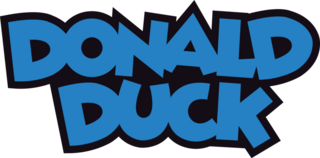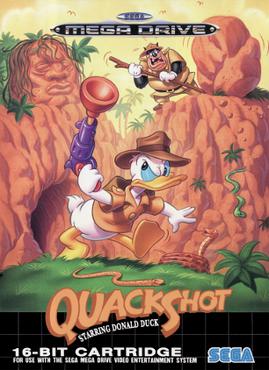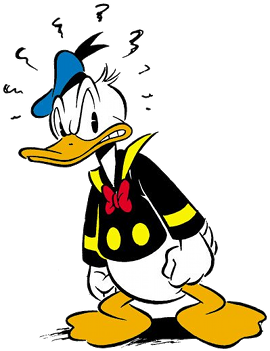
Huey, Dewey, and Louie are triplet cartoon characters created by storyboard artist (screenwriter) Carl Barks for The Walt Disney Company from an idea proposed by cartoonist Al Taliaferro and are the nephews of Donald Duck and the grand-nephews of Scrooge McDuck. Like their maternal uncles, the brothers are anthropomorphic white ducks with yellow-orange bills and feet. The boys are sometimes distinguished by the color of their shirts and baseball caps. They featured in many Donald Duck animated shorts and in the television show DuckTales and its reboot, but comics remain their primary medium.

Professor Ludwig Von Drake is a cartoon character created in 1961 by The Walt Disney Company. He is the paternal uncle of Donald Duck. He was first introduced as the presenter in the cartoon An Adventure in Color, part of the first episode of Walt Disney's Wonderful World of Color on NBC. According to the episode The Hunting Instinct of that series he and Donald Duck's father are brothers. He is described as a scientist, lecturer, psychologist, and world traveler. The character displayed his "expert" knowledge on a variety of subjects in eighteen episodes of the classic anthology series, as well as on a number of Disneyland Records.

Scrooge McDuck is a cartoon character created in 1947 for The Walt Disney Company by Carl Barks. Appearing in Disney comics, Scrooge is a Scottish-born American anthropomorphic Pekin duck. Like his nephew, Donald Duck, he has a yellow-orange bill, legs, and feet. He typically wears a red or blue frock coat, top hat, pince-nez glasses, and spats varying in color. He is portrayed in animation as speaking with a Scottish accent. Originally intended to be used only once, Scrooge became one of the most popular characters in Disney comics and Barks' signature work. Scrooge is an extremely rich duck who lives in the city of Duckburg in the fictional US state of Calisota, whose claimed location is in California in the real-world United States.

Gyro Gearloose is a cartoon character created in 1952 by Carl Barks for Disney comics. An anthropomorphic chicken, he is part of the Donald Duck universe, appearing in comic book stories as a friend of Donald Duck, Scrooge McDuck, and anyone who is associated with them. He was also a heroic creator star of the animated DuckTales. He first appeared in the Carl Barks comic "Gladstone's Terrible Secret", and was the regular lead character in 4-page backup stories in Barks' issues of Uncle Scrooge, starting with issue #13 and continuing through #41.

Mickey Mouse Works is an American animated television series produced by Walt Disney Television Animation featuring Mickey Mouse and his friends in a series of animated shorts. The first Disney television animated series to be produced in widescreen high definition, it is formatted as a variety show, with skits starring Mickey Mouse, Minnie Mouse, Donald Duck, Daisy Duck, Goofy, Pluto and Ludwig Von Drake while Horace Horsecollar, Clarabelle Cow, Morty and Ferdie Fieldmouse, Huey, Dewey and Louie, Chip 'n' Dale, Scrooge McDuck, Pete, Humphrey the Bear, J. Audubon Woodlore, Dinah the Dachshund, Butch the Bulldog, Mortimer Mouse, José Carioca, and Clara Cluck appear as supporting or minor characters. Musical themes for each character were composed by Stephen James Taylor with a live 12-piece band and extensive use of the fretless guitar to which the music of the series was nominated for an Annie Award in both 1999 and 2001. Most of the shorts from the series were later used in House of Mouse.

The Donald Duck universe is a fictional shared universe which is the setting of stories involving Disney cartoon character Donald Duck, as well as Daisy Duck, Huey, Dewey, and Louie, Scrooge McDuck, and many other characters. Life in the Donald Duck universe centers on the city of Duckburg and is a part of the larger Mickey Mouse universe. In addition to the original comic book stories by Carl Barks, the Duckburg cast was featured in Little Golden Books, television series such as DuckTales (1987–1991), Darkwing Duck (1991–1992), and the DuckTales reboot (2017–2021), and video games such as DuckTales (1989), QuackShot (1991), Goin' Quackers (2000), and DuckTales: Remastered (2013).

The Duck family is a fictional family of cartoon ducks related to Disney character Donald Duck. The family is also related to the Coot, Goose, and Gander families, as well as the Scottish Clan McDuck. Besides Donald, the best-known members of the Duck family are Huey, Dewey, and Louie, Donald's three triplet nephews.

The Junior Woodchucks of the World is a fictional scouting organization appearing in Disney comics and the DuckTales animated television franchise, most notably in adventures featuring Disney characters Huey, Dewey, and Louie as members.

Uncle Scrooge is a Disney comic book series starring Scrooge McDuck, his nephew Donald Duck, and grandnephews Huey, Dewey, and Louie, and revolving around their adventures in Duckburg and around the world. It was first published in Four Color Comics #386, as a spin-off of the popular Donald Duck series and is still presently ongoing. It has been produced under the aegis of several different publishers, including Western Publishing, Gladstone Publishing, Disney Comics, Gemstone Publishing, Boom! Studios, and IDW Publishing, and has undergone several hiatuses of varying length. Despite this, it has maintained the same numbering scheme throughout its six decade history, with only IDW adding a secondary numbering that started at #1.

DuckTales is an American animated television series produced by Walt Disney Television Animation. It originally premiered on syndication on September 18, 1987, and ran for a total of 100 episodes over four seasons, with its final episode airing on November 28, 1990. Based upon Uncle Scrooge and other Duck universe comic books created by Carl Barks, the show follows Scrooge McDuck, his three grandnephews Huey, Dewey, and Louie, and close friends of the group, on various adventures, most of which either involve seeking out treasure or thwarting the efforts of villains seeking to steal Scrooge's fortune or his Number One Dime.

Mickey's Twice Upon a Christmas is a 2004 American animated Christmas anthology film produced by Disneytoon Studios and directed by Matthew O'Callaghan. The film includes stories directed by Peggy Holmes, O'Callaghan, Theresa Cullen, and Carole Holliday. It is the computer-animated sequel to Mickey's Once Upon a Christmas (1999). It features Mickey Mouse, Minnie Mouse, Pluto, Goofy, Max, Donald Duck, Daisy Duck, Huey, Dewey, and Louie, and Scrooge McDuck, in five different segments rather than three like its predecessor. It received generally positive reviews from critics.

QuackShot Starring Donald Duck, released in Japan as QuackShot Gurujia-ō no Hihō, is a 1991 platforming video game developed and published by Sega for the Sega Genesis. The game was released in Europe in 1991, in North America on December 19, 1991, and in Japan the following day. QuackShot stars Donald Duck and his three nephews, Huey, Dewey, and Louie, as treasure-hunters. The game was influenced by the Indiana Jones film series.
Scrooge McDuck and Money is an American animated short film produced by Walt Disney Productions, directed by Hamilton Luske, and featuring the characters Scrooge McDuck and Huey, Dewey, and Louie. The short was released on March 23, 1967.

DuckTales: The Quest for Gold is a platform game developed by Incredible Technologies for the Amiga, Commodore 64, Atari ST and MS-DOS. It was published in 1990 by Walt Disney Computer Software. The game bears little resemblance to the Capcom game known simply as DuckTales that was released for the NES and Game Boy.
Donald Duck, a cartoon character created by the Walt Disney Company, is today the star of dozens of comic-book and comic-strip stories published each month around the world. In many European countries, Donald is considered the lead character in Disney comics, more important and beloved than Mickey Mouse.
Mythos Island is a nine-part comic series made for Egmont. It is a crossover between the Mickey Mouse universe and the Duck universe. It is written by Pat and Carol McGreal and Per Erik Hedman and drawn by César Ferioli.

"A Little Something Special" is a 1997 Disney comics story created by Don Rosa to celebrate the 50th anniversary of Scrooge McDuck's first appearance in Carl Barks's "Christmas on Bear Mountain" in 1947.

Donald Duck is a cartoon character created by The Walt Disney Company. Donald is an anthropomorphic white duck with a yellow-orange bill, legs, and feet. He typically wears a sailor shirt and cap with a bow tie. Donald is known for his semi-intelligible speech and his mischievous, temperamental, and pompous personality. Along with his friend Mickey Mouse, Donald was included in TV Guide's list of the 50 greatest cartoon characters of all time in 2002, and has earned a star on the Hollywood Walk of Fame. He has appeared in more films than any other Disney character.















